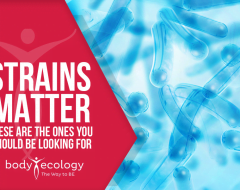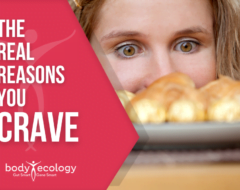New To Body Ecology? Start HERE To Learn The 7 Principles

When it’s time to make big changes in our health, we often put focusing on our diet at the top of the list. The Body Ecology Way of life is not just a diet, but is a system of health and healing that goes beyond following a list of what to eat and what not to eat. That’s because it’s based on Universal Laws that are in tune with Nature. The Principle of Uniqueness, for example, tells us right away that there is not just one way we should all be eating. Just like snowflakes in a winter storm, we are all very unique. With Body Ecology’s 7 Principles, you can achieve your goals and spend a lifetime looking and feeling your best.
Creating the right program for you, along with balancing your inner ecosystem, is very possible and doesn’t have to be difficult. And foods do play a starring role. But always with the 7 Universal Laws in mind, as we explain below.
Body Ecology also has two stages. Stage One follows a very low carb diet and is gluten and casein free. It’s more limited in the number of foods to eat because at first we want to focus on:
– Building your immune system to conquer infections and the inflammation they cause
– Establishing a thriving microbiome
Stage Two allows you to bring in more foods you avoided in Stage One. Both Stages allow you to eat delicious, balanced meals. (You’ll find recipes online and in our Body Ecology Living Cookbook.)
In this article, we give a brief overview of the 7 Principles of Body Ecology to help you understand how our proven-effective system has been helping people achieve their best health for more than 25 years.
Is It Time To Get Your ‘Inner Ecosystem’ Back On Track?
The Body Ecology program will also help you establish the missing piece: The inner ecosystem, which is key to your health.
Your inner ecosystem (aka your ‘microbiome’) is made of beneficial bacteria and other instrumental microbes (including good yeast) that live in your intestines, keeping you healthy and strong. But if you are tired, have bowel disorders, are not happy with your weight, have frequent colds or flu, are still suffering from long-term Covid symptoms, or are worried about future viruses, then it’s important to focus on your inner ecosystem.
Beneficial bacteria (also known as microbes) do many things, including help digest the foods you’re eating. A lifestyle that includes stress and poor eating habits kills the beneficial, microscopic “good guys” that keep you healthy, possibly setting the stage for disease.³
The Body Ecology System of Health and Healing guides you in using fermented foods and drinks to repopulate your digestive system with a wide diversity of bacteria needed to help digest food, assimilate nutrients, and enhance immunity. They are the power foods of people who live longer, more productive, disease-free lives.
Body Ecology’s 7 Principles Based on Universal Laws
Donna Gates spent years researching both the ancient and the most current systems of nutrition and healing to create a program that includes the wisdom of each, yet surpasses them all. Recognizing that everything has a front and a back — or a positive and a negative — Body Ecology takes the positive from many healing disciplines and finds solutions for the negatives.
The 7 Healing Principles are a result of this work, and the highlights are outlined here:

– The Principle of Balance is based on the concept of yin and yang, the opposing energy forces from ancient Chinese and Japanese traditions. Everything in the world has some properties of yin and yang but in varying proportions.
– Yin energy is light, expansive, wet, soft, cold, and more vegetal. Yang energy is heavy, contracting, dry, hard, hot, and more animal. Body Ecology uses the terms “expansion” and “contraction” to explain the yin and yang energy of the food you eat because yin and yang are hard to put our mind around and remember which one is which.
– Some foods, like sugar and alcohol, are way too expansive for your body. Your bloodstream quickly absorbs sugar and produces energy, making you feel temporarily open and relaxed, yet these foods are damaging because they’re so far from the centerpoint of balance. To achieve true health, the goal is always about balance.Other foods, like excessive amounts of (and poor-quality) salt and animal products, are more contracting and cause your cells to feel tight and constricted.
– Highly expansive foods make you crave contracted foods. Think sugar laden soft drinks that soon have you reaching for those salty potato chips.
To achieve truly balanced meals, you’ll want to eat those foods that are naturally balanced. Those are your vegetables and ocean vegetables. Without understanding this principle, you are probably unknowingly creating imbalance and a vicious cycle of cravings.

– To maintain health, your blood must be slightly alkaline. The foods you eat and the lifestyle choices you make impact your body’s ability to maintain that alkaline state.
– Foods can be alkaline, acidic, or neutral in your body. Your goal would be to have a balance of alkaline and acidic foods so that you can maintain the alkaline state of your blood.
– If you get out of balance and your blood becomes too acidic, you may become more susceptible to illness and disease.⁴ At the same time, lifestyle choices like stress, lack of exercise and sunlight, medications, and not getting enough sleep are causing your body to become too acidic.⁵
– You need alkalizing foods to bring it back into balance.
Some of the most common alkalizing foods include: Most vegetables, ocean vegetables, millet and quinoa, lemons, limes, low sugar berries, and unsweetened pomegranate, cranberry, and black currant juice, cultured foods and probiotic liquids, Celtic Sea Salt, herbs and herbal teas, mineral water, raw apple cider vinegar.
– As humans, we share so many similarities with one another, but your body is quite unique. What conditions are you currently dealing with? Are you pregnant or nursing? Have mold illness, candida, SIFO or SIBO?
– How old are you?
– Do you live in a hot, temperate of cold climate?
– Are you vegetarian or vegan?
Each of us is an experiment of one, and for that reason, you may need to modify certain elements of any diet or lifestyle to suit your own individual needs.

– Did you know your body cleanses every day? Through elimination, urine, tears, and sweat, your body rids itself of toxins that would otherwise build up and contribute to DNA damage, early aging, sickness and disease. So Nature is always cleansing to stay perpetually alive, expanding and thriving as She has for billions of years. (We might add, – in spite of us humans). We have a fantastic power embedded within us to cleanse, too!
– A temporary worsening of symptoms, suddenly feeling really tired (even if you had enough sleep), fevers, colds, achy joints and skin eruptions are all common signs that your cells have dumped toxins and/or dying mirrobes (like yeast, mold and bacteria). When these are in the bloodstream and releasing a lot of toxins at one time, it’s normal to feel worse temporarily. While it’s actually a sign that you are on your way to healing, it’s certainly not comfortable.
– Cleansing shouldn’t be suppressed. Actually, one of the very best tools for moving quickly through this die off stage is to do home enemas — one each day until your symptoms disappear. It often only takes just one.
As you start on the Body Ecology program, cleansing is inevitable. Don’t just hang in there…While it certainly is an option, be proactive. Strengthen your immune system by resting. Saunas are great; fasting helps too, but do drink 3-4 ounces per day of any of your favorite Probiotic Liquid and take probiotics to also build your microbiome, which is where 75% of your immune system lives. If you decide to do a modified fast that day, you can also drink a Probiotic Protein Shake or an Immune Power Shake.

– The Body Ecology lifestyle teaches that combining certain foods when you eat can either help or hinder your digestion. Combining foods that don’t digest easily when eaten together leads to slowed or impaired digestion, causing food to potentially ferment in your stomach or toxins to be released in your intestines. Undigested proteins, for example, create ammonia in the gut, which is very toxic to the brain. Undigested foods also make your large and small intestines more attractive to the growth of pathogens.
This is a highly useful principle to help improve your health — and often one of the most misunderstood. For a more in-depth look at this principle, read this article, where you’ll learn 1) How and when to eat fruit, 2) What to combine with proteins, and 3) What to combine with grains and starchy vegetables.
To learn even more secrets for proper food combining directly from Donna, check out a recent Facebook Live she did on this topic!

This principle has two concepts that aid your digestion:
– Quantity — Overeating severely weakens your digestive system. Give your stomach room to digest your food by only filling it to 80 percent of capacity and leaving 20 percent empty to help your body digest.
– Quality – Likewise, 80 percent of every meal should be land and ocean vegetables. The other 20 percent should be either a protein or a grain-like seed (quinoa and millet, prepared properly to remove the oxalates).
Some tips for success with the 80/20 principle: 1) Eat slowly and chew your food well to help digestion, 2) Stop eating when you’re satisfied and become familiar with the feeling of 80% full, and 3) Look at your plate before you eat: see if land and ocean vegetables take up 80% of the space. If not, subtract some starches or protein and add more vegetables!

– This is the Universal Principle of Time. It takes time to rebuild your health. You cannot expect instant healing, but making small, yet consistent changes—step by step—each day leads to a happier healthier you.
– Make sure that each day you learn a bit more, put that into practice until it becomes second nature and never stop learning.
– Build the foundation your body needs to support optimal, long-term health.
– Starting any new program is about creating new habits. It takes time and effort, which is often hard when your schedule is busy. Try to carve out time to heal and even put times on your calendar.
Step by Step also asks the question, “Where do I begin?” Here’s some suggestions….
– Do lab tests to find underlying causes. Find a skilled functional medicine practitioner to be your partner on this journey.
– Focus on your gut and start by removing pathogens and establishing a healthy microbiome.
– Eliminate foods that are inflammatory and feed pathogens like candida.
– Correct poor lifestyle habits— like not prioritizing sleep.
– Find ways of reducing stress. You can’t heal if you are under stress.
– All of the above will elevate your energy which is also the first step towards healing.
Start your journey to wellness, but go at the pace that works for you. Going cold turkey rarely works. Do expect slip backs from time to time, but get right back up again and keep moving forward with your eye on the goal. It’s always better to make small changes and spend the time ensuring they become rooted habits. Then take your next step.
The Universe advances like this—Step By Step.
REFERENCES:
1. Anette Christ, Patrick Günther, Mario A.R. Lauterbach, Peter Duewell, Debjani Biswas, Karin Pelka, Claus J. Scholz, Marije Oosting, Kristian Haendler, Kevin Baßler, Kathrin Klee, Jonas Schulte-Schrepping, Thomas Ulas, Simone J.C.F.M. Moorlag, Vinod Kumar, Min Hi Park, Leo A.B. Joosten, Laszlo A. Groh, Niels P. Riksen, Terje Espevik, Andreas Schlitzer, Yang Li, Michael L. Fitzgerald, Mihai G. Netea, Joachim L. Schultze, Eicke Latz. Western Diet Triggers NLRP3-Dependent Innate Immune Reprogramming. Cell, 2018; 172 (1-2): 162 DOI: 10.1016/j.cell.2017.12.013.
2. Konrad C. Bradley, Katja Finsterbusch, Daniel Schnepf, Stefania Crotta, Miriam Llorian, Sophia Davidson, Serge Y. Fuchs, Peter Staeheli, Andreas Wack. Microbiota-Driven Tonic Interferon Signals in Lung Stromal Cells Protect from Influenza Virus Infection. Cell Reports, 2019; 28 (1): 245 DOI: 10.1016/j.celrep.2019.05.105.
3. Benoit Chassaing, Omry Koren, Julia K. Goodrich, Angela C. Poole, Shanthi Srinivasan, Ruth E. Ley, Andrew T. Gewirtz. Dietary emulsifiers impact the mouse gut microbiota promoting colitis and metabolic syndrome. Nature, 2015; DOI: 10.1038/nature14232.
4. Wu T, Seaver P, Lemus H, Hollenbach K, Wang E, Pierce JP. Associations between Dietary Acid Load and Biomarkers of Inflammation and Hyperglycemia in Breast Cancer Survivors. Nutrients. 2019;11(8):1913. Published 2019 Aug 15. doi:10.3390/nu11081913.
5. Smith ZR, Horng M, Rech MA. Medication-Induced Hyperlactatemia and Lactic Acidosis: A Systematic Review of the Literature. Pharmacotherapy. 2019 Sep;39(9):946-963. doi: 10.1002/phar.2316. Epub 2019 Aug 29. PMID: 31361914.











